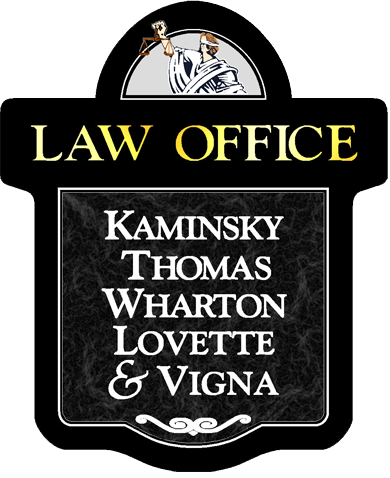Bankruptcy

Deciding whether or not to file for relief under the bankruptcy laws can be one of the hardest decisions you ever have to make. Our bankruptcy services include filing for protection under Chapter 7 and 13 of the Bankruptcy Code and our attorneys and knowledgeable staff will work with you every step of the process.
Whether you are drowning in credit card debt, overwhelmed by collection agencies, or facing judgments and foreclosure the most important step in moving forward is to understand the options available to you under the law. Meeting with one of our attorneys early in the process will help you in controlling the path forward.
An experienced attorney at Kaminsky, Thomas, Wharton, Lovette & Vigna will be able to assist you in determining whether you are eligible to file a Chapter 7 petition or whether you will benefit from by filing under Chapter 13.
Chapter 7
Chapter 7 is designed for debtors in financial difficulty who do not have the ability to pay their existing debts. Debtors whose debts are primarily consumer debts are subject to a “means test” designed to determine whether the case should be permitted to proceed under chapter 7. If your income is greater than the median income for your state of residence and family size, in some cases, creditors have the right to file a motion requesting that the court dismiss your case under § 707(b) of the Code. It is up to the court to decide whether the case should be dismissed.
Under chapter 7, you may claim certain of your property as exempt under governing law. A trustee may have the right to take possession of and sell the remaining property that is not exempt and use the sale proceeds to pay your creditors.
The purpose of filing a chapter 7 case is to obtain a discharge of your existing debts. If, however, you are found to have committed certain kinds of improper conduct described in the Bankruptcy Code, the court may deny your discharge and, if it does, the purpose for which you filed the bankruptcy petition will be defeated.
Even if you receive a general discharge, some particular debts are not discharged under the law. Therefore, you may still be responsible for most taxes and student loans; debts incurred to pay nondischargeable taxes; domestic support and property settlement obligations; most fines, penalties, forfeitures, and criminal restitution obligations; certain debts which are not properly listed in your bankruptcy papers; and debts for death or personal injury caused by operating a motor vehicle, vessel, or aircraft while intoxicated from alcohol or drugs. Also, if a creditor can prove that a debt arose from fraud, breach of fiduciary duty, or theft, or from a willful and malicious injury, the bankruptcy court may determine that the debt is not discharged.
Chapter 13
Chapter 13 is designed for individuals with regular income who would like to pay all or part of their debts in installments over a period of time. You are only eligible for chapter 13 if your debts do not exceed certain dollar amounts set forth in the Bankruptcy Code.
Under chapter 13, you must file with the court a plan to repay your creditors all or part of the money that you owe them, using your future earnings. The period allowed by the court to repay your debts maybe three years or five years, depending upon your income and other factors. The court must approve your plan before it can take effect.
After completing the payments under your plan, your debts are generally discharged except for domestic support obligations; most student loans; certain taxes; most criminal fines and restitution obligations; certain debts which are not properly listed in your bankruptcy papers; certain debts for acts that caused death or personal injury; and certain long term secured obligations.
NOTICE: WE ARE A DEBT RELIEF AGENCY THAT COUNSELS IN DEBT RELIEF. WE HELP PEOPLE FILE FOR BANKRUPTCY RELIEF UNDER THE BANKRUPTCY CODE.
Our attorneys are experienced in representing creditors, including banks, corporations, small businesses, and individuals in both state and federal court. We provide legal services for both secured and unsecured creditors ranging from civil judgments, and mortgage foreclosure to complex bankruptcy proceedings. Our financial services include documenting commercial loans, workouts, collections, and foreclosures. While our bankruptcy services include proof of claim filing, stay litigation, adequate protection disputes, discharge challenges, objections to plan confirmation, and case monitoring. Whether you need to initiate a collection matter or need guidance with a customer’s bankruptcy our attorneys have the experience needed to protect your legal rights.
